Can books save our lives? Maybe. Definitely they can make it better, more tolerable and more interesting
Delos Digital’s ATLANTIS is a series of books born with the explicit intention of publishing solarpunk literature: utopian, optimistic, speculative fiction.
ATLANTIS
Ἀτλαντὶς νῆσος, the first utopia of human civilisation, the submerged continent, a rich land that housed imposing and beautiful buildings, generated goods and products in abundance to support its large population, and was ruled by sober and virtuous governments. Atlantis, 2000 years before Roger Bacon’s island, a window into the past to show us the direction of the future.
In the first series of Atlantis, in 2021, 10 Italian authors tell the future with a newly optimistic gaze. In the best tradition of science fiction, writers do not limit themselves to writing adventures set in a more or less remote future or in distant worlds and societies: they try to indicate a way, imagine a path, to give a warn but at the same time to be proactive.
Every national literature had an underground utopian current that never really anticipated things to come, but undoubtedly planted the roots of a better future in thought. In recent years we have witnessed the explosion of dystopian fiction. Born as a spin-off of science fiction – Orwell, Zamyatin, Huxley – dystopia has transformed into a genre of its own, with peculiar aesthetics and audience. With the passing of the baton between generations, dystopia (or anti-utopia) became insitutionalised, and changed from speculation and warning against the distortions of our civilisation, to a self-referential and self-comforting genre, which often means Young Adult adventures.
Franco Ricciardiello, Preface to “Assalto al sole”, the first solarpunk anthology of Italian authors
If there were a Cartesian map of science-fiction, Solarpunk would probably be at the opposite end of Dystopia
Recovering an outdated but always suggestive distinction between a concept of art as interpretation of reality and art for art’s sake—and in the latter there is also dystopia, despite its original vocation—we must think to a third category, the one beloved by the surrealists: art changes life. Not surprisingly, one of the best inspirations of the sound current that renewed the science fiction of the Sixties, the New Wave, was Surrealism.
ATLANTIS: solarpunk stories of anticipation, redemption, sustainability, sense of wonder, solidarity, art, technology, science, energy, democracy, utopia even ambiguous—
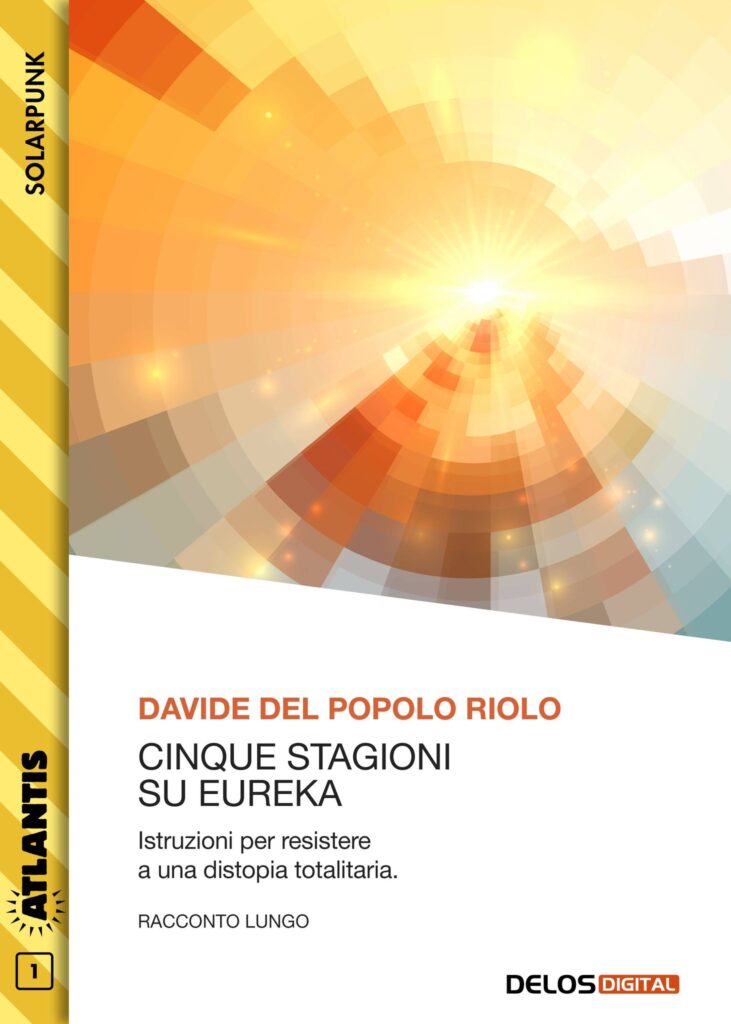
Atlantis # 1
Davide Del Popolo Riolo
Five Seasons On Eureka
How to restist a totalitarian dystopia. On other worlds, among distant stars, can humanity consider itself healed from the injustice and oppression that have characterised its entire history on Earth? Or as usual, we’ll learn nothing from the past? The city-state of Nea Athena is a colony that the Nine Space Powers founded on the planet Eureka, making a formal commitment not to damage its ecology, to respect and protect it in every way; for this purpose the CPA, Central Planetary Administration, was born. But it has already happened in the past that a power not subjected to control feels free from any ethical, moral or democratic rule: and Nea Athena’s utopia turns into a totalitarian nightmare that does not tolerate opposition. What can a citizen do when he feels free, like the young Erno, who fed on the sweet milk of democracy in his family? No wonder if it will be the prison, instead of the school, the place where he will learn the value of solidarity, nonviolent resistance and collective action.
Politics, representation, participatory democracy in the future in a short novel by the author Urania Prize 2019

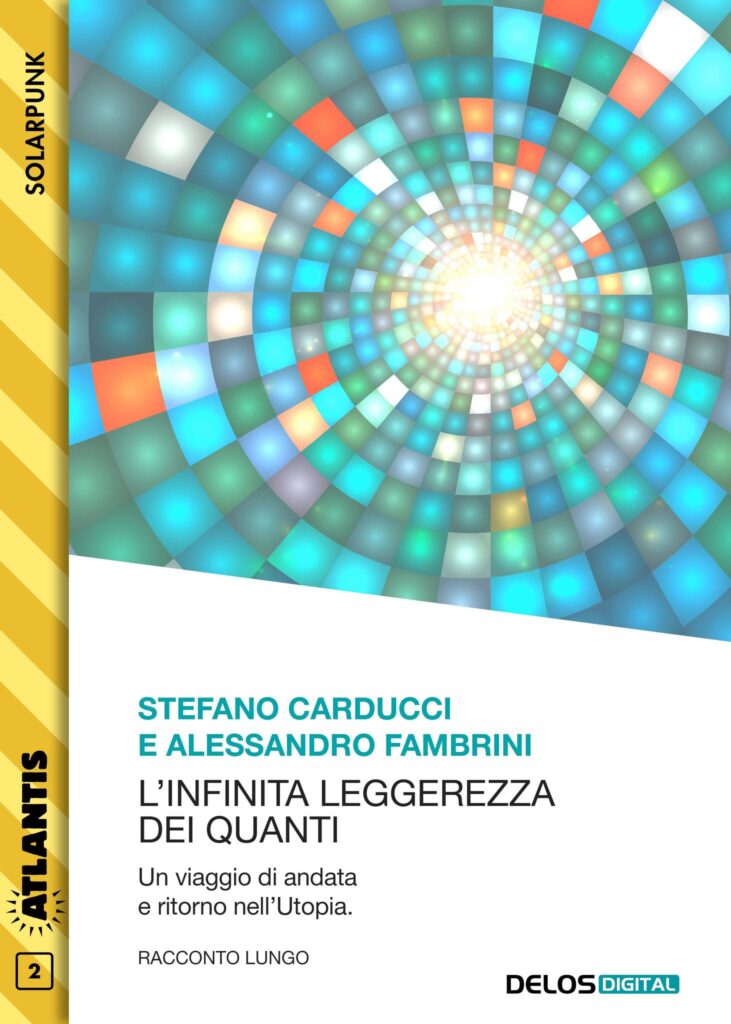
Atlantis # 2
Stefano Carducci e Alessandro Fambrini
The Infinite Lightness Of Quanta
A journey to Utopia, with return. Raise your hand if you think ours is the best of all possible worlds. Certainly Joseph Lovato does not think so, forced by the paranoid military junta in the government to become the subject of an experiment with an uncertain outcome: to prove the practical usefulness of the hypotheses on elementary particles, he will be “transferred” instantly between two points as a quantum object. Something is not working according to forecasts, Lovato finds himself in a parallel reality, the antipodes of the dystopian present from which he comes. The society to which Mary, Peter and the other scientists who come into contact with him belong, is a kind of democratic anarchy, decentralized in North America, strongly science-oriented, with a sustainable anthropogenic impact on the environment. In the best tradition of sociological science fiction, Carducci and Fambrini tell of an utopian society that has won against the worst enemy: human nature. However, utopia is surrounded by fierce adversaries who are preparing an invasion, and Lovato will be called upon to contribute, with his scientific preparation, to eradicating the threat.
Distribution of resources, cheap energy, post-industrial civilization in this short novel by the most famous author couple of Italian SF: Stefano Carducci & Alessandro Fambrini.

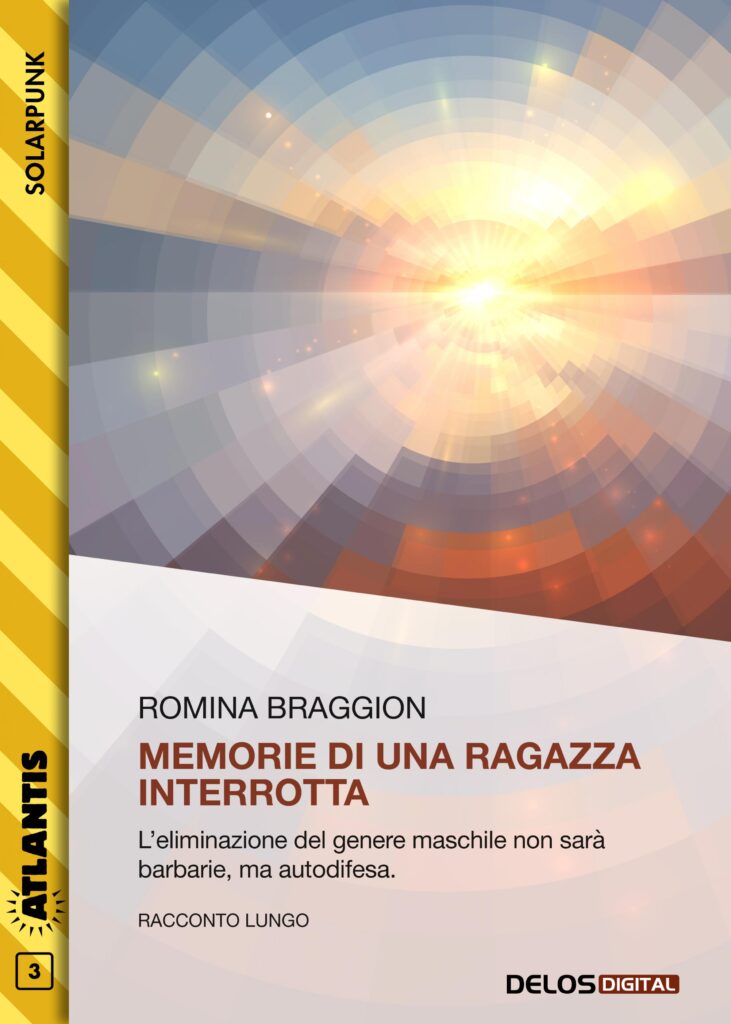
Atlantis # 3
Romina Braggion
Memoirs Of An Interrupted Girl
The elimination of the male gender will not be barbarism, but self-defense. In a rather distant future, the young Ada is a sophista, a student who lives in an all-women commune with a sustainable impact on the territory, in the mountains around Lake Maggiore, Northern Italy. Like her companions, Ada’s days are marked by study, work and socializing, but this is not a monastic organization. Interpersonal affairs are regulated by totally alien relationships, with sexual roles as matrices and nurses: this is due to a ‘hyperosmic mutation’ following which male humans were exstinguished centuries earlier. And so Ada’s inner struggle, which leads her to the threshold of maturity, has its roots in a story much closer to our time: the escape of two women, Elisa and her mother, through a world torn by a total war between the genders: the future of civilization is entrusted to the two women, to their moral heritage and to the Book of Females that will be the result, a book which after centuries risks becoming fossilized in an unassailable dogma.
Issues of gender, morals, changes of mentality and language: Romina Braggion writes a deeply radical story for today’s sensibility; but it is clear that, in the future world that she’s describing, the extremist era would be the one we live in now.

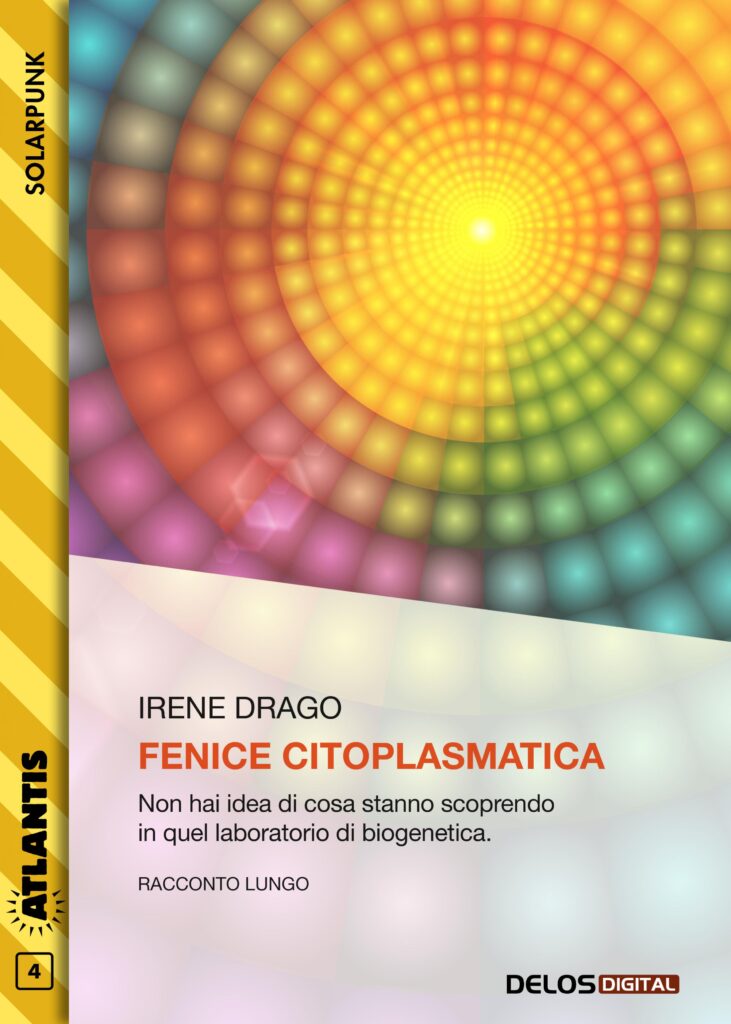
Atlantis # 4
Irene Drago
Citoplasmic Phoenix
You have no idea what they’re discovering in that biogenetics lab. If you imagine the future as a uniform civilization – the dystopia of a suffocating total control, or asustainable utopia in which there are no more conflicts – you are far from the truth. There is the revolución verde, of course, with its floral intuitions of bio-architecture, but there is also the accident at the Bushehr nuclear power plant in the Persian Gulf, and the genetic mutations it caused on living creatures. Andrea studied and collaborated with the best minds in biotechnology, Nobel prize-winning brains, and has now accepted a job in a cutting-edge division of medical research in Tehran, in the Second Islamic Republic. But all his knowledge and relationships, and all the means of advanced genetic engineering, seem powerless against the cancer that is about to eat his daughter alive. What is the solution, is there a hope? Who will help him? His Australian friend Jack King, who works in the Bushehr radioactive zone? The results on embryogenesis achieved by Rosselli at Kromanthea, the biogenetic company closed thirty years ago? His former teacher Ricci, who is said to work on Alzheimer’s and Parkinson’s, and on whose research his friend Ivano, the genius of neurology, who survived a coma, whispered: “You have no idea …”?
Genetics, medicine, therapy in the near future, in the novelette of one of the promises of Italian science fiction.

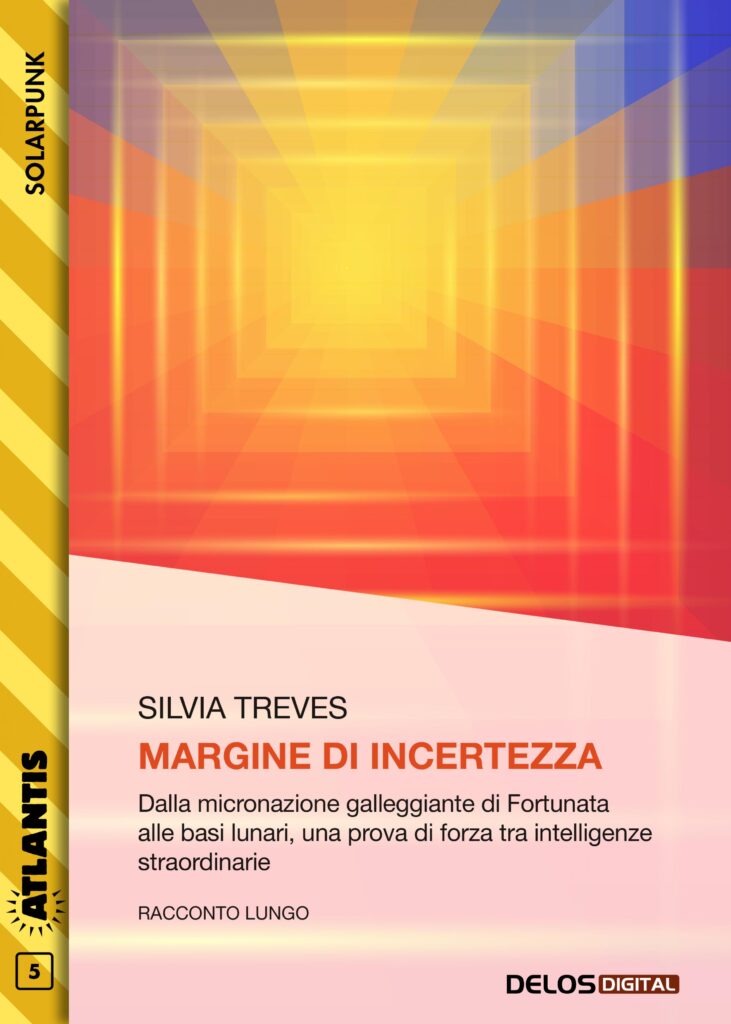
Atlantis # 5
Silvia Treves
Margin Of Uncertainty
From the floating micronation of Fortunata to the Moonbase, a showdown between extraordinary intelligences. Why does the Ministry send a special envoy such as T-consultant Ignas, endowed with extrasensory powers, to the artificial island of Fortunata, a libertarian agro-cooperative and aspiring micronation born in the darkest period of the climate emergency? Why does the island asked not to invade its airspace, and what is happening in the dynamics between its original inhabitants, the consorters, and the latest arrivals, the cousins, diverted here from the lunar bases of Pandia and from the Asteroid Belt where they had chosen to emigrate? Declared redundant by private companies that exploit satellites, in retaliation against the onerous exo-environmental directives approved by the New Responsible Sustainability that rules human civilization, the cousins are disappointed by this makeshift arrangement. Called to settle a job negotiation, Ignas finds himself tangled up in a pre-civil conflict that suddenly becomes dangerous when he discovers that his direct antagonist has herself extraordinary mental powers. To settle the conflict and neutralize the social danger, Ignas will have to reconstruct the dynamics of a fatal accident on the Moon, and come face to face with the ottimati who still hold almost indisputable power thanks to the extent of their wealth.
Work, post-industrial civilization, migration, space economy in a novelette by Silvia Treves.

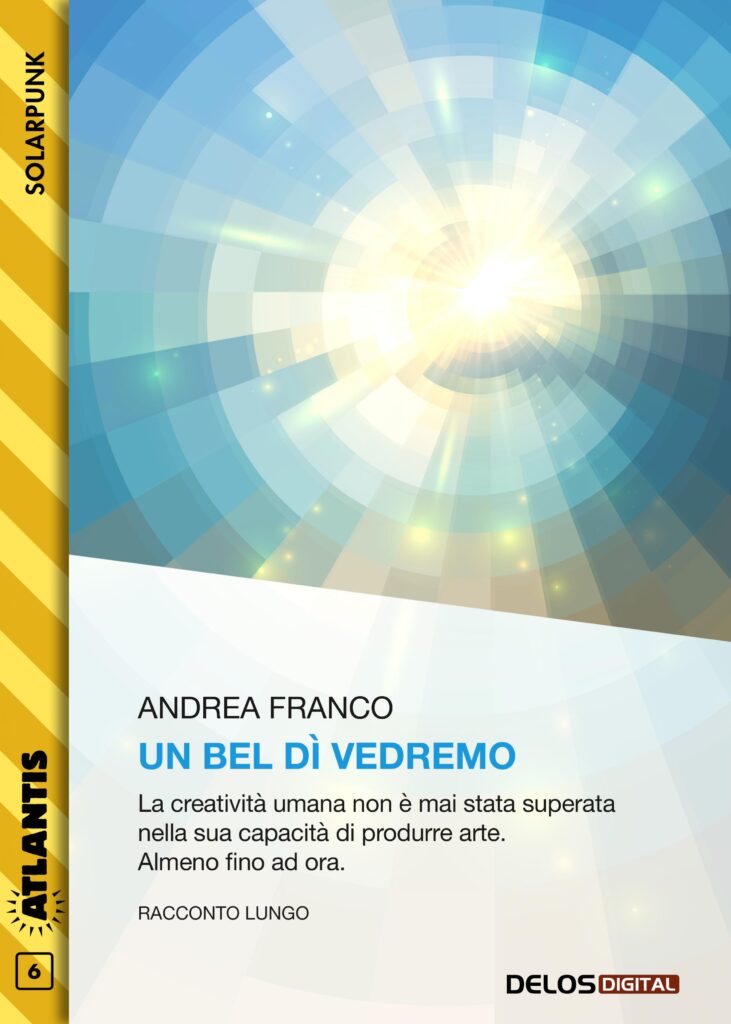
Atlantis # 6
Andrea Franco
Un Bel Dì Vedremo
Humanity is unsurpassed in its ability to create art. At least until now. Music is among the artistic manifestations that most immediately characterize an era. The twentieth century, with the novelty of audio recording, made it possible to reproduce and listen to all the great music of the past, and consequently generated a number of passionate fans of art music—not least Opera. Italy, cradle of the Opera for almost three centuries, also in the near future hands down the tradition of the great interpreters in their theater live performances, with the relevant peculiarity that it is really possible to appreciate voices such as that of the soprano Rosina Storchio (1872 -1945), right on the stage of the Teatro dell’Opera in Rome or the San Carlo in Naples. It is not a magic trick, nor a resurrection, but cybo technology, the last frontier of bioengineering: cybernetic s plus cloning, and here you have a new version of humanity—a different race, on the contrary, i.e. for those who believe that cyborg attitudes are not artistic expression, but the result of a software. Legislation must of course take note of the existence of cybo; but according to what principle? As autonomous beings, endowed with reasoning and creativity, or with all the distrust of a conservative society that feels the traditional conception of the human being threatened? The final result will be influenced by the tug-of-war between an orchestra conductor like Maestro Clemens Zimmermann, stubbornly hostile to novelty, and the far-sighted Paolo Mastrilli, Minister of Culture, who feels directly involved in the ethical problem of cybo.
The future of art and opera in the novelette of one of the most prestigious names in genre fiction in Italy.

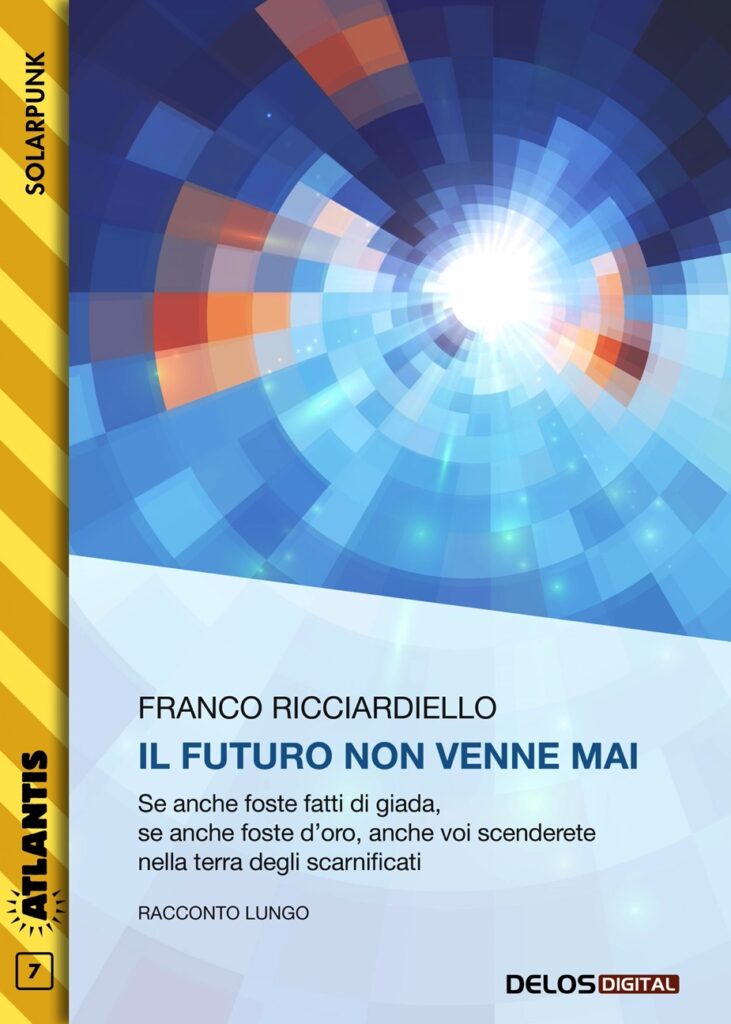
Atlantis # 7
Franco Ricciardiello
The Future Never Came
Even if you were made of jade, even if you were cast in gold, you shall also descend to the Land of the Scarnified. This is the Interlude, an interstitial period between today’s world, the Anthropocene, and Chthulucene, the world of sustainability. The city of Purpura Marina entrusts Simon Drago with the task of carving the face of the founder of Integral Democracy, Amala Singh, on a cliff by the sea; but the artist is challenged by the chthulupunks, radical ecological activists who do not want the rock disfigured by a mammoth sculpture. Drago has two children: Santiago, who is doing a training internship on the lunar colony, and Miriam, a multimedia artist whose songs inflame the young people of an Africa still subjected to corrupt dictatorships and the suffocating moralism of the Pentecostal church. Their adoptive little brother Enkel is madly in love with Miriam. The balance between the characters is upset by the arrival of Lauriana Montiel, a former star of retro-realism, an art that transforms old nineteenth-century B&W films into 3D works, with the protagonists replaced by real actors. The beautiful Lauriana becomes the personification of the feminine ideal for Enkel and a nightmare for Miriam, who senses something in the past of her father and the actress. The sunny, green Purpura Marina inevitably transforms itself into the scenery of a drama.
Arts of the near future in a novelette by Franco Ricciardiello.

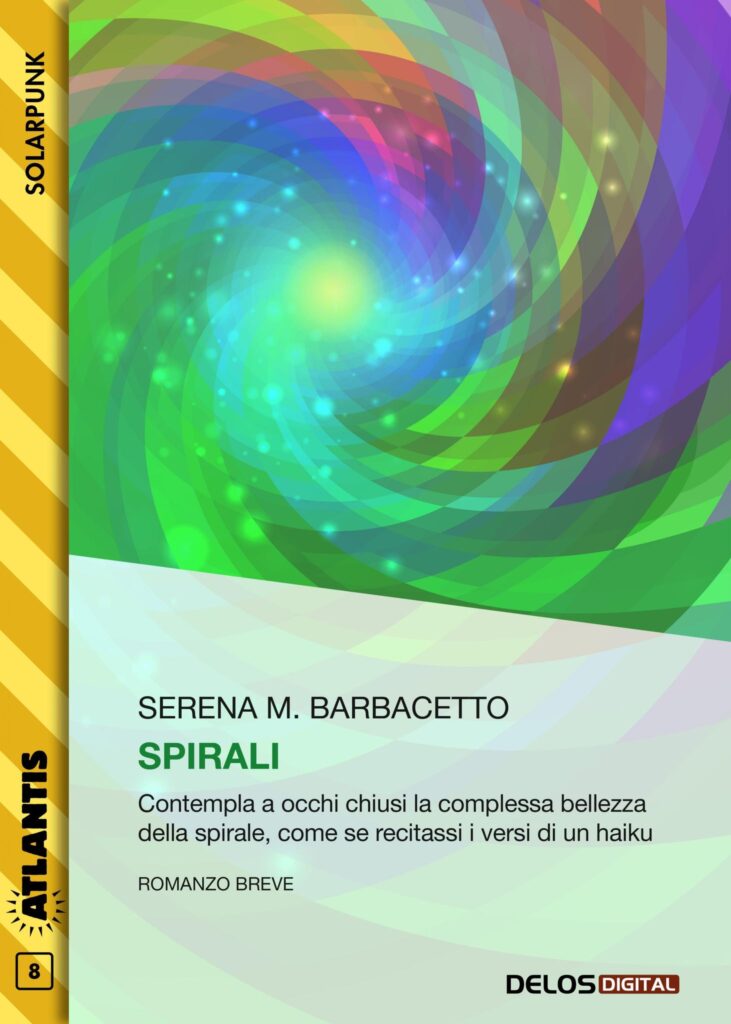
Atlantis #8
Serena M. Barbacetto
Spirals
CONTEMPLATE WITH EYES CLOSED THE COMPLEX BEAUTY OF THE SPIRAL, AS IF RECITING THE VERSES OF A HAIKU. The Earth spreads its seeds in the solar system. An orbital station, a scientific team, a swarm of meteorites are the elements of a tragedy that takes place in space, and that changes the life of the second-generation colonist Isabel Jiménez Ruiz for good. From this moment, the young researcher will strive to resolve the complex issue of food self-sufficiency in permanent colonies. Everything conspires to show her that it is a cultural problem rather than one of resources: the concept of “food” for the settlers is no longer that of the terrestrials. Isabel must therefore go against her instincts, and trust in the feeling that binds her to her grandmother Sofía, who, in order to bypass the unwinnable limits of physiology and biology, and go beyond the extinction of individual consciousness, had to evolve into a new form of life. And it is precisely the affection of the ancestor that demonstrates to Isabel, engaged in the new, ambitious and colossal Eden Project, how the nature of Earth is the repository of a vital force and a adaptability superior to any technology of human origin.
Food, agriculture, sustainability of the space economy in a novelette by Serena M. Barbacetto.

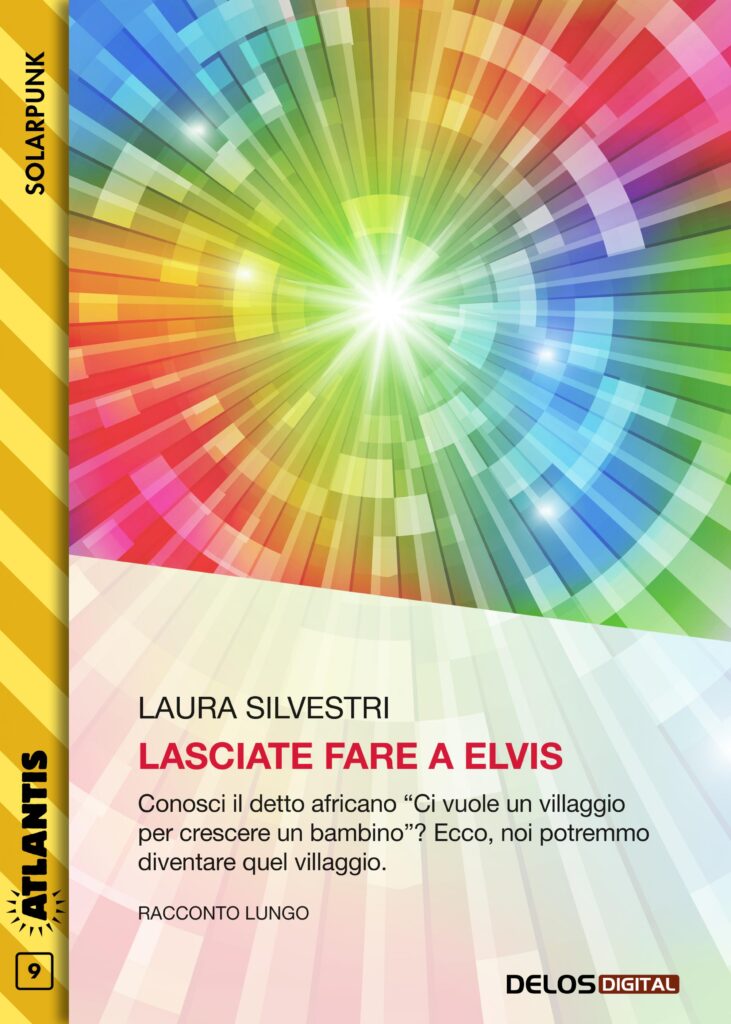
Atlantis # 9
Laura Silvestri
Leave It Up to Elvis
DO YOU KNOW THE AFRICAN SAYING? IT TAKES A VILLAGE TO RAISE A CHILD. WE COULD BECOME THAT VILLAGE. Magliana, South Rome, in the not too distant future: to avoid the effects of the climate crisis, Italy has taken drastic decisions that heavily affect everyday life. As the concierge of a large apartment building, Elvis has a privileged observatory on the facts that in a torrid summer week risk dragging the neighborhood into a devastating free-for-all. A sudden interruption in the distribution of water, and the aggressiveness of the neighboring buildings in intercepting the drones with the emergency supply, forces the tenants to put aside small conflicts if they want to obtain water to survive. Under the relentless sun that hammers the streets and buildings of the township, the residents of the condominium learn that solidarity offers more advantages than the war between the poor: facing the water crisis together teaches them that despite the struggle they have it in the DNA, because their life has never been easy, a supportive community offers an incomparable advantage over a conflict that consumes resources. And so, without recriminations for the golden age of unbridled consumerism, Elvis and his friends prove to be suitable for the sustainable future that scaled back industrial civilization.
CITIES, POST-INDUSTRIAL CIVILISATION, URBAN TRANSFORMATION, INTERPERSONAL RELATIONS IN A NOVELETTE BY LAURA SILVESTRI

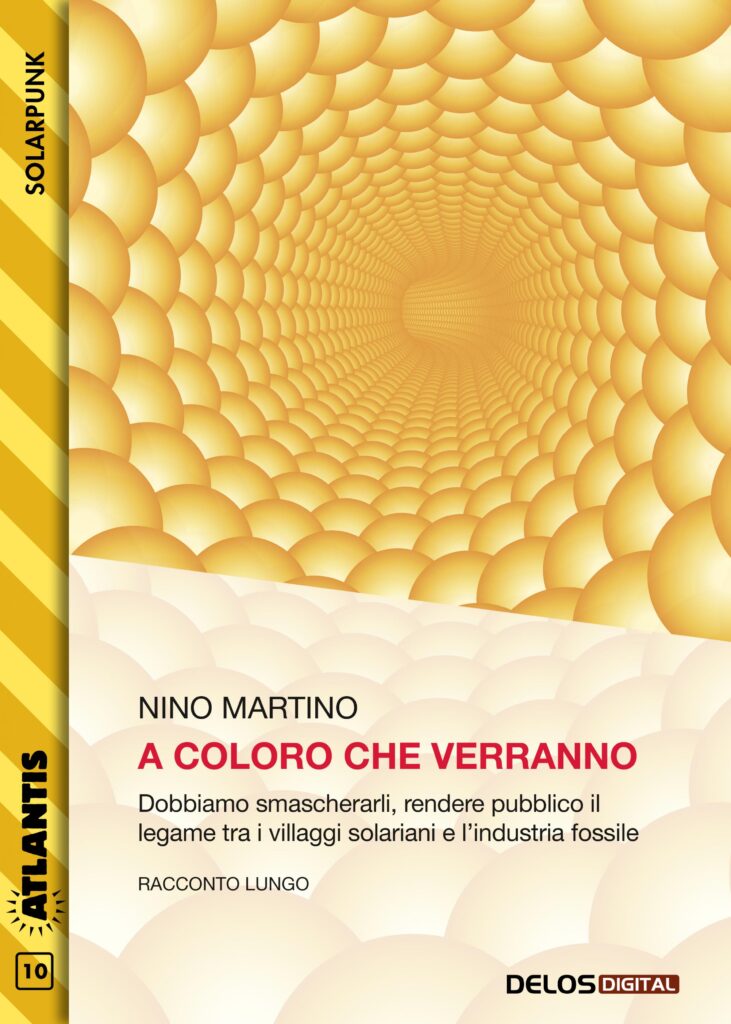
Atlantis # 10
Nino Martino
To Those Who Will Come
WE HAVE TO UNMASK THEM, MAKE PUBLIC THE LINK BETWEEN THE SOLARIAN VILLAGES AND THE FOSSIL INDUSTRY. Despite the deep crisis of fossil fuels, industrial capital will not give up without a fight: it will try to manipulate public opinion through a facade environmentalism, to divert attention from the impact of production on the ecology of the planet. In particular, a network of “Solarian villages” very similar to a New Age cult is the coverage that should divert attention from the predatory activity of the industry that sponsors it. The leading of these Ecovillages, the Sole Nascente, is located near Arbatax on the east coast of Sardinia and is not easy to access. In addition to devoting themselves to agricultural work, its inhabitants cultivate a herb with hallucinogenic powers. A tourist from Paris arrives at a nearby hotel: Mateo Koné, a native of Mali, nation that freed himself from economic dependence on the West during the Great Revolt. He has with him an artificial intelligence with prodigious capabilities, hidden behind the guise of an innocent small backpack, and is in contact with the Science Network, an organization that fights greenwashing and relies on the structure of the Lunar colony. Will he be able to unmask Ravi, the grand master of the ecovillage? And Anna, the hotel receptionist, what role does she play in this operation?
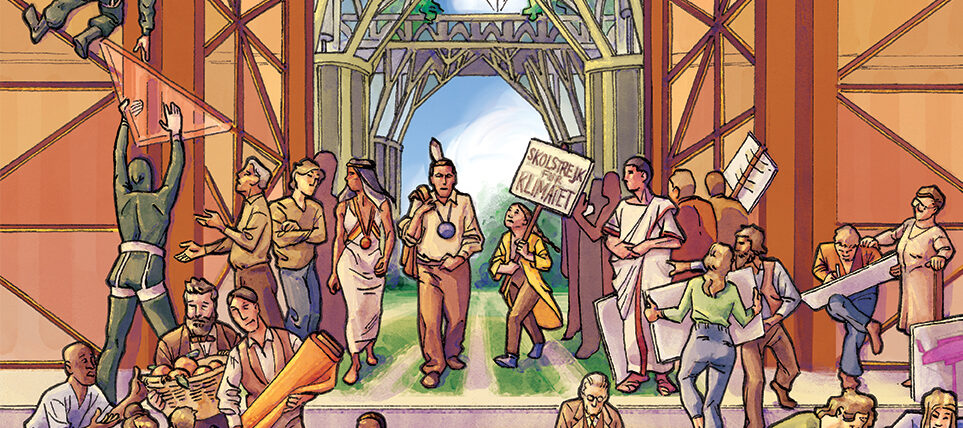
Comments are closed